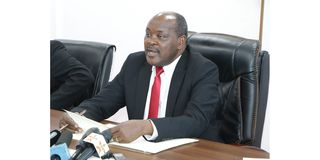Tanzania's independent electoral body to launch voter register upgrade

Independent National Electoral Commission's chairman Jacobs Mwambegele addressing reporters
What you need to know:
- With a budget of Sh418 billion, the grand inauguration of the permanent Voter Register (PVR) upgrade is slated for July 1, 2024 in Kigoma region
Unguja. Tanzania's voter register is set to swell to 34,746,638 citizens, up by a staggering 5,586,433 voters from 2020, marking an impressive 18.7 percent surge, following the recent census.
With a budget of Sh418 billion, the grand inauguration of the permanent Voter Register (PVR) upgrade is slated for July 1, 2024 in Kigoma region, graced by Prime Minister Kassim Majaliwa.
Addressing reporters in Unguja on May 15, 2024, the Chairman of the Independent National Electoral Commission (INEC), Appeals Court Judge Jacobs Mwambegele, affirmed the Commission's commitment to revamping the register ahead of the 2025 elections.
Judge Mwambegele revealed that the enhancement initiative would kick off on the inauguration day in Kigoma and extend its reach to the regions of Katavi, Rukwa, and Tabora, encompassing a meticulous 13-cycle process outlined in the forthcoming schedule.
The upgrade endeavors to enlist new voters aged 18 and above, while also diligently updating the information of existing voters to ensure compliance with electoral laws.
Furthermore, the initiative, projected to conclude by March 2025, offers an opportunity for previously registered voters who have relocated between regions to seamlessly update their details.
"We are committed to issuing new cards to voters who have misplaced or damaged their cards and expunging those who no longer meet the eligibility criteria, including cases of renounced citizenship or death," said Judge Mwambegele.
With meticulous planning already completed, the Commission has meticulously vetted a total of 40,126 registration centers, with 39,709 situated in mainland Tanzania and 417 in Zanzibar.
Judge Mwambegele also announced the Commission's technological leap forward, unveiling a refined Voter Registration System (VRS) seamlessly integrated with modern BVR kits, operating on the user-friendly Android platform, ensuring efficiency unlike ever before.
"We are excited to introduce the Online Voter Registration Improvement System (OVRS), empowering voters to initiate the registration process online via their mobile devices or computers," remarked Judge Mwambegele.
Upon completion of the online process, voters are kindly requested to visit their nearest voter center to finalize the procedure and receive their updated voter card.
Moreover, the Commission has devised a special procedure to cater to the needs of incarcerated citizens, with 130 dedicated centers across mainland Tanzania and an additional 30 in Zanzibar.
However, in adherence to section 10 (1) (C) of the Presidential, Parliamentary, and Local Authorities Election Act number one of 2024, individuals serving sentences exceeding six months will not be eligible for registration.
Equipped with cutting-edge technology, the Commission has procured 6,000 BVR devices equipped with state-of-the-art fingerprint scanners to capture voters' information, ensuring a smooth and accurate registration process.
The Commission has meticulously crafted a comprehensive set of documents and guidelines to steer the enhancement of the permanent register, ensuring transparency and efficiency throughout the process.
Before commencing the upgrade, the Commission will convene meetings with election stakeholders at the national and regional levels, fostering collaboration and collective participation.
INEC Director of Elections, Kailima Ramadhani, underscored the inclusivity of the equipment, catering to citizens with diverse disabilities, including those with unreadable fingerprints.





